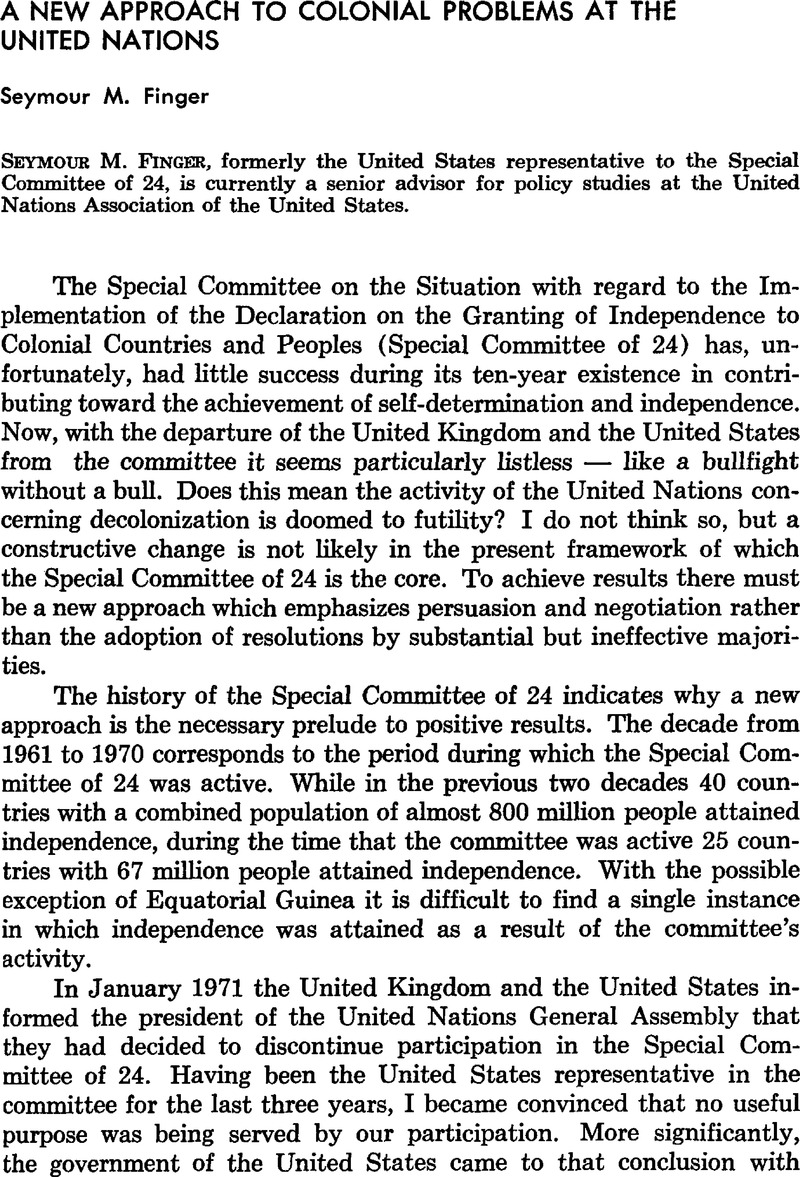Published online by Cambridge University Press: 22 May 2009

1 UN Document A/AC.109/SR.574, pp. 5–7.
2 General Assembly Resolution 1514 (XV), December 14, 1960.
3 General Assembly Resolution 2621 (XXV), October 12, 1970, operative paragraph 3 (2).
4 Charter considerations with respect to such actions are thoughtfully analyzed by Rupert Emerson in his article, “Self-Determination,” American Journal of International Law, 07 1971 (Vol. 65, No. 3), pp. 459–475.Google Scholar
5 UN Document A/8066, annex 1.
6 The difficulties imposed by this limitation have been effectively described by Cohen, Benjamin V., “The United Nations in Its Twentieth Year,” International Organization, Spring 1966 (Vol. 20, No. 2), p. 205;CrossRefGoogle Scholar and by UN Secretary-General U Thant in an address to the News Media Seminar at United Nations headquarters, December 3, 1970.
7 Caradon, Lord, “New Opportunities at the UN,” Vista, 07–08 1971 (Vol. 7, No. 1), pp. 17–21.Google Scholar
8 Later, in 1966, they did vote to establish the UNCDF over the opposition of the major developed countries — and it did become an empty symbol. In the 1950s the proposed fund was known as the Special United Nations Fund for Economic Development (SUNFED); the new designation — UNCDF — was introduced in 1960.
9 See Gardner, Richard N., “The United Nations Conference on Trade and Development,” in The Global Partnership: International Agencies and Economic Development, ed. Gardner, Richard N. and Millikan, Max F. (New York: Frederick A. Praeger, Publishers, 1968), pp. 117–118.Google Scholar
10 In conformity with article 108 of the charter amendments must be “adopted by a vote of two-thirds of the members of the General Assembly and ratified in accordance with their respective constitutional processes by two-thirds of the Members of the United Nations, including all the permanent members of the Security Council.”
11 It is interesting, however, to observe the extent to which the African states have been directing colonial problems more and more to the Security Council in recent years. While it is difficult to know for certain why they have done so, it is reasonable to speculate that one important factor is the automatic involvement of the major Western powers. The Organization of African Unity (OAU) has now proposed that the Security Council hold a special meeting in Africa next year “on all aspects of decolonization and racial discrimination.” (Press conference by Foreign Minister Faruk of the Sudan held at UN headquarters, New York, 07 12, 1971.)Google Scholar